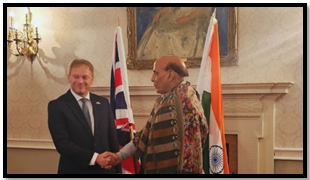CRAFTING A NEW PHASE IN INDIA-U.K. DEFENCE TIES
Relevance:
GS 2
- Bilateral, regional and global groupings and agreements involving India and/or affecting India’s interests.
- Effect of policies and politics of developed and developing countries on India’s interests, Indian diaspora.
Why in News:
- After a 22-year gap, Defence Minister Rajnath Singh visited the U.K., marking a significant revival in defence ties.
- The expansion of Chinese military influence, particularly in the Indian Ocean, has prompted both India and the U.K. to reassess and strengthen their strategic partnership.
Source- The Quint
India-UK Defence Relations
Historical Context:
- Origin: British influence on India’s military structure during colonial times.
- Post-1947: Shift from colonial ties to a strategic partnership, underpinned by common democratic values, language, and historical connections.
Evolving Partnership:
- 21st Century: Strengthened focus on defence collaboration.
- High-level Engagements: Frequent visits and dialogues enhancing cooperation in counter-terrorism, maritime security, and military exercises.
- 2020 Milestone: Introduction of the ‘Framework for the India-UK Defence Partnership’, laying out a structured pathway for future collaboration.
Capability Enhancement and Technological Cooperation:
- The Indian Navy is focused on addressing its capability gaps, especially in comparison to the People’s Liberation Army Navy (PLAN).
- A prime focus of the visit was acquiring critical technologies from the U.K. to bridge these gaps.
- A notable area of cooperation is in electric propulsion technology for aircraft carriers, a domain where the U.K. has considerable expertise.
Advancements in Naval Technology and Collaborations
- Discussions and preliminary engagements regarding the transfer of electric propulsion technology were key highlights before and during Mr. Singh’s visit.
- Despite the PLAN’s challenges with electric propulsion, evidence suggests its integration into their warships, pushing the Indian Navy to accelerate its efforts in this domain.
- Electric propulsion offers strategic advantages like reduced acoustic signatures and increased power generation for major subsystems.
Strategic Realignment and Joint Initiatives:
- The increasing presence of the PRC in the Indian Ocean Region (IOR) serves as a strong rationale for enhanced India-U.K. defence ties.
- Joint military exercises and deeper defence industrial cooperation have been initiated, with the U.K. announcing the deployment of specialized naval groups to the region.
| Defense exercises
Ajeya Warrior: · Type: Army Exercise · Objective: To bolster counter-terrorism and counter-insurgency capabilities. · Details: Ajeya Warrior, conducted biennially alternating between India and the UK, involves the Indian Army and the British Army. It places a particular emphasis on urban warfare, close-quarter battle drills, and joint tactical exercises. Konkan: · Type: Naval Exercise · Objective: To enhance maritime cooperation and interoperability between the Indian Navy and the Royal Navy. · Details: Konkan is an annual naval exercise that has been ongoing since 2004. It encompasses various aspects of naval operations, including anti-submarine warfare, air defense, and surface warfare. Indra Dhanush: · Type: Air Force Exercise · Objective: To promote cooperation and understanding between the Indian Air Force and the Royal Air Force. · Details: Indra Dhanush is an air force exercise focused on joint air combat and air mobility operations. It facilitates the exchange of expertise in areas such as fighter operations and air maintenance. Exercise Information Warrior · Type: Joint Cyber Exercise · Objective: To strengthen cyber capabilities and collaboration in addressing cyber threats. · Details: Information Warrior is a cyber exercise jointly conducted by both nations, enhancing their abilities to counter cyber threats and safeguard critical infrastructure. Exercise Cope India: · Type: Air Force Exercise · Objective: To enhance combat capabilities and interoperability between the Indian Air Force and the Royal Air Force. · Details: Cope India is a trilateral exercise involving the Indian Air Force, the United States Air Force, and the Royal Air Force. It focuses on air combat training, aerial refueling, and airlift missions. Ex-Eastron: · Type: Joint Ground Exercise · Objective: To strengthen capabilities in joint anti-terrorism operations. · Details: Ex-Eastron is a joint exercise that brings together the Indian and British Special Forces. It concentrates on special operations and counter-terrorism scenarios, fostering cooperation and expertise exchange in this critical domain. |
Challenges and Strategic Dynamics
- The India-U.K. defence relationship faces challenges, particularly in reconciling the U.K.’s historical ties with both India and Pakistan.
- Issues like Khalistan and Sikh separatism further complicate bilateral relations.
- India-Pakistan Hyphenation: India feels London’s outlook still hyphenates India with Pakistan, impacting security and terrorism cooperation.
- Bilateral Efforts: India’s efforts to address security and terrorism concerns in its relations with Britain not yielding desired results.
- Illegal Migration: Pressure from the UK on India to repatriate over 100,000 illegal Indian immigrants.
- Impact on India-EU Relations: Brexit poses challenges to India-EU strategic partnership, requiring India to manage relations with the EU without the UK.
Bilateral Engagements and Future Plans:
- The “India-UK electric propulsion capability partnership” was established, with initial meetings and delegation-level discussions focusing on the transfer of technology and know-how.
- Future plans include the integration of electric propulsion in the Indian Navy’s landing platforms docks and next-generation guided missile destroyers.
- Convergence on Global Issues: Both countries share common views on global issues, endorse a rule-based international order, and support each other’s aspirations, such as India’s bid for a permanent seat on the UN Security Council.
- Importance of Non-European Allies: With the UK’s departure from the EU, it emphasizes the need to strengthen alliances with non-European countries like India.
- Areas of Cooperation: The potential for cooperation spans security, defense, joint military exercises, and collaborative efforts to reform international institutions like the UN and WTO.
- Trade and Economy: An India-UK Free Trade Agreement (FTA) has been instrumental in boosting trade between the two countries, with India being one of the world’s fastest-growing economies.
Source
The Hindu
Mains Question
Analyse the evolving dynamics of India-U.K. defence relations in the context of global strategic shifts. Discuss the opportunities and challenges embedded within this partnership, particularly focusing on technological cooperation and regional geopolitical implications.

 Source- The Quint
Source- The Quint

